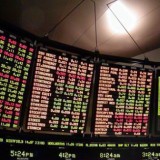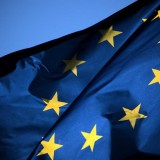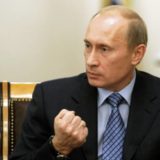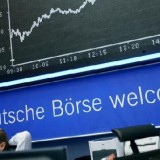Posted on 28 April 2014. Tags: British Petroleum
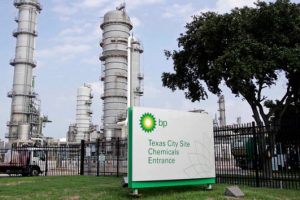 The international energy company British Petroleum (BP) reported a decline in profit in Q1 2014, mainly due to the higher costs in the demand for oilfield. The company’s production fell with 8.5% to 2.13 million barrels per day in the first quarter, as also cautioned that it will shrink more in the second quarter. The reason is the planned major maintenance, especially of the sites in the North Sea and the Gulf of Mexico.
The international energy company British Petroleum (BP) reported a decline in profit in Q1 2014, mainly due to the higher costs in the demand for oilfield. The company’s production fell with 8.5% to 2.13 million barrels per day in the first quarter, as also cautioned that it will shrink more in the second quarter. The reason is the planned major maintenance, especially of the sites in the North Sea and the Gulf of Mexico.
The profit, taking into account the costs of restocking of the company, declined with 23% to 3.23 billion USD compared with 4.22 billion USD an year ago. The revenues for the quarter fell with 2.6% to 91.71 billion USD from 94.11 billion USD. The net profit of the company amounted to 3.53 billion USD against 16.86 billion USD an year ago, and the big difference is due to last year’s sale of BP’s share in TNK-BP for 12.5 billion USD.
The company announced that it will increase its dividend to 9.75 cents per share for Q1 2014, and that it intends to retain its investment in the Russian oil company Rosneft, despite the US decision to impose sanctions on its Executive Director Igor Sechin.
Posted in Business, Finance
Posted on 27 April 2014. Tags: Deutsche Bank
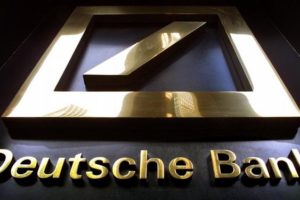 The European biggest investment bank Deutsche Bank AG, reported a sharp decrease in profit trends for the first fiscal quarter of 2014 after the retreat to trade in debt securities. The net profit of the lender declined by 34% yoy to 1.08 billion EUR in Q1 2014. The achieved level still exceeds the market sentiment for a result of 1.01 billion EUR.
The European biggest investment bank Deutsche Bank AG, reported a sharp decrease in profit trends for the first fiscal quarter of 2014 after the retreat to trade in debt securities. The net profit of the lender declined by 34% yoy to 1.08 billion EUR in Q1 2014. The achieved level still exceeds the market sentiment for a result of 1.01 billion EUR.
The Frankfurt-based company also reported that its revenue from the trading fixed assets, currencies and commodities, fell with 10% to 2.430 billion EUR, beating the average score of analysts for 2.12 billion EUR.
Deutsche Bank is one of the investment banks that felt most serious decline in the global investment amid the uncertainty about the monetary policy and geopolitical crisis in Eastern Europe. In recent months, the German lender faced numerous calls from investors to raise its capital by selling shares after earnings remain still under pressure from the shrinking balance made in order to meet more stringent regulatory rules.
The bank announced that the ratio of Tier I capital (Tier 1 Capital) under the rules of Basel III, has given way to 9.5% from 9.7% at the end of December 2013. The reason for this is the increased risk assets. The level is the lowest among the nine biggest investment banks in Europe.
Late last week was revealed that Deutsche Bank may be heading for a major share issue to raise capital before the stress test of the European Central Bank and the European Banking Authority. The largest investment bank in Europe could sell shares for 5 billion EUR. The transaction is expected in June or later in the year. Earlier this month the German Deutsche Bank AG announced that it is ready to cut bonuses in the future to meet the regulatory requirements for the ceiling of remuneration.
Posted in Business, Finance
Posted on 21 April 2014. Tags: Dow Jones, Nasdaq, S&P 500
The leading US indices ended the first weekly trading session with growth, albeit the anemic trade during the day after the Easter holidays. Many traders continued their vacation today, after the exchanges in Europe were closed for the holiday.
Nasdaq index was the index with highest growth in the first session of the week, as the value of the technology index reached level of 4,121.55 points or an increase of 0.64%. The growth was based on the good performance of the pharmaceutical company Sarepta Therapeutics, which reported that by the end of the year will submit to the Agency on FDA its experimental medicine to treat the disease Duchenne muscular dystrophy. The shares of the company rose with 41% to a price of 34.38 USD per share. The good financial results of AMD led to an increase in the price of the processor manufacturer’s shares with more than 12% to a price of 4.15 USD per share. AMD announced that will reduce the losses in the first quarter due to increased revenues of 28% to 1.4 billion USD. For the first three months of the year the company has managed to reduce its losses to 20 million USD compared to 146 million USD for the same period of 2013.
The blue chip index Dow Jones Industrial Average rose with 0.25% to 16,449.25 points. The border index S&P 500 recorded its longest series of growth since October 2013 after increased with 0.38% to 1,871.86 points.
The rumors of the deal between Berrick Gold and Newmont, led to the growth of the shares of Newmont mining company with almost 6% to 25 USD per share. On the other side were the shares of Berrick Gold, which fell with 3% to a price of 17.44 USD per share.
Posted in Finance, Indexes
Posted on 16 April 2014. Tags: European Union
Eurozone inflation in March was reported at level of 0.5%, compared to 0.7% in February. The consumer price index decreased across the European Union, as in March has already reached 0.6%, compared to 0.8% in February. The figures are well below the annual limit of 2% set by the European Central Bank. The statistics will definitely intensify the pressure for action on the governors of the central bank in monetary union of the EU. The observers analyze whether the bank to take interest rate changes or to launch a program for the purchase of securities.
At its meeting earlier this month, the ECB left unchanged its key interest rate at level of 0.25%.
The last month’s inflation delays in 19 EU countries, increased in 6 and remained unchanged in 3. Bulgaria is the country with the most severe deflation into the community. According to Eurostat in March the measured deflation in the poorest country in EU is within 2%, followed by Greece (-1.5%) and Cyprus (-0.9%). At the opposite side is UK, where was measured inflation of 1.6% in March.
The main reason for the reduction in consumer prices in the Eurozone was the reduced fuel costs for transport and fuels for heating. At the same time slightly increased the costs made by the Eurozone residents for restaurants, entertainment and the prices of dairy products and eggs.
The data of the European Statistics Office also show that in March 2013, the inflation in the Eurozone was 1.7% and in the European Union was 1.9%.
Posted in Economy, Finance
Posted on 15 April 2014. Tags: Total
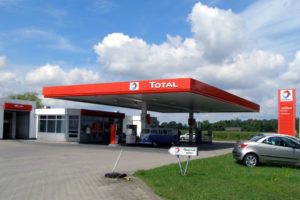 The French oil company Total will spend 16 billion USD for the development of deep waterfront project in Angola. The Kaombo project was one of many, which have been delayed in recent years as the oil companies gave in to the demands of its shareholders to cut the capital spending and return more cash.
The French oil company Total will spend 16 billion USD for the development of deep waterfront project in Angola. The Kaombo project was one of many, which have been delayed in recent years as the oil companies gave in to the demands of its shareholders to cut the capital spending and return more cash.
The investors argued that at a time of high costs and stagnant price of oil companies need to reduce costs for expensive projects and use the money for dividends and share repurchase. Many oil groups heeded the call of their investors. BP last year announced that it would sell assets to 10 billion USD within two years and will use most of the money for repurchase shares. The Italian Eni also announced repurchase program.
Last July Total announcing that the company’s investments will begin to decline in 2014. Earlier this year, the company raised its dividend from 0.59 EUR to 0.61 EUR per share despite the significant drop in quarterly profit. The latest results of Total, released in February showed 19% drop in net profit for Q4 2013 due to weak processing and delays in key oil fields.
However, the oil giant announced that will resume the Kaombo project after its cost were reduced from 20 to 16 billion USD. The facility will have a capacity of 230 thousand barrels per day, as the production is expected to start in 2017.
Now the company Total is the largest operator in Angola and the second largest oil producer in Africa with 600 thousand barrels per day, which accounts for over 30% from the GDP of the country. Total owns 30% from the Kaombo project, as the Angolan state company Sonangol P&P also has 30%, Sonangol Sinopec International has 20% and Esso owns 15%.
In January, Total said it will become the first oil group, which will invest in emerging shale sector in the UK, announcing plans to spend about 50 million USD for exploration of gas fields in the East Midlands.
Posted in Business, Finance

Posted on 15 April 2014. Tags: Nickel
 The futures contracts on nickel rose to 14-month high on Monday after Goldman Sachs analysis showed that the price of the asset will continue to grow. The precious metal has a strong interest from the beginning of the year, as till 1st January has gained more than 28% amid the concerns about possible supply constraints.
The futures contracts on nickel rose to 14-month high on Monday after Goldman Sachs analysis showed that the price of the asset will continue to grow. The precious metal has a strong interest from the beginning of the year, as till 1st January has gained more than 28% amid the concerns about possible supply constraints.
According to experts from Goldman Sachs the asset price may rise further in the coming months, reaching 20,000 USD per ton. During the late European trade on Monday on the metal futures prices rose by 2.02% to 1,077.20 USD per kilogram heading for 11th consecutive session of growth. The ascending series is the longest since October 2010.
The analysts from Goldman Sachs comment that they are optimists about the future of the nickel price, as the rally of the price is mostly reflected by the ongoing Indonesian ore export ban and the concerns about the potential impact of international sanctions against Russia.
Only in the previous session, the price of nickel rose with 1.5% amid the concerns about possible blocking of supply. Earlier this month, another major financial company - Citigroup, raised its forecast for the price of the nickel in 2015 with 13% to 21,500 USD per ton.
Posted in Commodities, Finance
Posted on 15 April 2014. Tags: Nestle
Nestle published the data on sales in the first quarter of 2014, which were below the analysts’ expectations. The strong CHF also played a role, but the company assured that the sales will rise later during the year. The sales revenue for Q1 2014 were 20.8 billion CHF (23.6 billion USD), as the analysts forecast were for earnings of 21.456 billion CHF.
The cold weather in USA and later celebrating Easter this year chilled the mood of the consumer purchases, according to experts of Nestle. After the report the company confirmed its forecast for the year sales and profit. According to the analysis the company will perform better in the second half of 2014, as the expectations are for growth of 5%.
“The growth of our core business in the first months of the year was in line with the expectations and was driven by volumes rather than prices. The continuing the presentation of new products with good performance supported this growth amid tough market conditions”, said CEO of Nestle Paul Bulcke. “We expect that the continued appreciation of the franc would have a negative impact on the revenues”.
In the first three months of 2014, the expansion of production slowed to 4.2% from growth of 5.3% recorded in the last quarter of 2013. The figure was slightly above the analysts’ expectations for growth of 4.1%.
Posted in Business, Finance
Posted on 15 April 2014.
The World Trade Organization (WTO) increased slightly its forecast for the growth in world trade in 2014 to 4.7%. The forecasts increase is based on the predictions for increase in the world GDP.
Although the current forecast of the organization for 2014 is more optimistic than the expected increase of 4.5% in the September, it still remains gloomy compared to the forecasts of an year ago. The main reason is the slow recovery of the European Union. Also it is not clear yet whether the trade is finally stopped growing at two times from the rate of the gross domestic product, as that was the trend until the global economic crisis.
However, 80% of protectionist policies introduced since 2008 are still in force, as they must disappear with the improvements in the economic growth. The World Trade Organization does not provide estimates of trade in services, but reported that the global exports of services grew with 6% to 4.6 trillion USD in 2013, compared to increases of 2% in 2012.
Posted in Economy, Finance
Posted on 15 April 2014. Tags: Dow Jones, Nasdaq, S&P 500
The US stock markets closed the first session of the week with increases despite the ongoing global political instability. The trade was supported by the economic data from the country, which showed stronger than expected growth in retail sales. The blue chip index Dow Jones Industrial Average rose with 0.89% to 16,169.00 points. The wide benchmark S&P 500 added 0.66% to a value of 1,823.65 points, while the technology Nasdaq Composite closed with a growth of 0.68% to 3,467.40 points.
Following the reported 22% growth during the last week, the fear index VIX, known officially as the CBOE Volatility Index, fell with 0.46% to 16.57 points. The index is a leading measure of uncertainty among the investors. The lack of a strong jump in VIX shows that there is not much panic on Wall Street and investors are looking for good options for their money.
Earlier in the day the Ministry of Commerce revealed the data for retail sales in March. The trade expanded with the rapid pace in the past year and a half, signaling that the economy comes out of hibernation and is set to accelerate in the second quarter. The retail trade in the largest economy in the world rise with 1.1% in March, as the increase was the largest since September 2012.
Meanwhile the quarterly profit of Citigroup Inc rose unexpectedly, as the net profit of the investment bank rose with 3.5% to 3.94 billion USD. Data for the period surprised the analysts after the financial institution was able to recover the funds set aside as provisions for bad loans.
The USD improved its positions against the major currencies. The yields on 10-year government bonds used in the formation of interest rates on mortgages and other consumer loans, added two basis points to 2.644%. The investment gold with June delivery rose to 1,326.70 USD per ounce, while the WTI crude oil prices fell to 103.61 USD per barrel.
Posted in Finance, Indexes
Posted on 14 April 2014. Tags: CAC 40, DAX 30, FTSE 100, FTSEurofirst 300, IBEX 35
The European markets recovered from the heavy losses during the last week trade, closing with slight increases in Monday. The growth rates were supported by the data on retail in USA that surprised the forecasts. The pan-European benchmark FTSEurofirst 300 expanded with 0.43% to 1,318.58 points, traded with slight decrease in the earlier session. Most affected were the companies from the technology sector. Ericsson shares fell with 4.4%, while Alcatel-Lucent wiped 3.4%.
The British FTSE 100 expanded with 0.10% to 6,568.29 points, while the German DAX 30 added 0.11% to 9,325.85 points. The French CAC 40 grew to 4,382.46 points, expanding with 0.38%. In Spain IBEX 35 slid with 0.37% to 10,167.90 points.
The weaker EUR helped for growth of the European markets from low levels. The optimism was raised by the financial results of Citigroup, which quarterly net profit grew with 3.5% to 3.94 billion USD. Meanwhile the retail sales in USA rose in March with the fastest pace for the last year and half, which is a sign that the economy is coming out of hibernation and is about to accelerate in the second quarter. The retail trade in the largest economy in the world grew with 1.1% on a monthly basis according to figures from the US Commerce Department. The increase was the largest since September 2012.
The investors’ sentiment remained subject of the ongoing conflict in Eastern Europe. Earlier in the day the Western countries and Russia held another meeting without much result regarding the crisis in Ukraine. The tension in the country is getting deeper, which hardly reflects the markets in the world.
On the European macroeconomic front, Greece publishes primary budget surplus of 1.6 billion EUR in the first quarter of 2014. The level is more than three times larger that the achieved an year earlier. The optimistic result also exceeds the target set in the bailout program for the Mediterranean country. Athens international lenders wanted to achieve a primary surplus of 878 million EUR.
Meanwhile the European Central Bank (ECB) announced that may consider buying assets as an option for keeping the interest rates low in long term. The market took this as another sign indicating that the bank is ready for serious action in an attempt to prevent the arrest of inflation in the Eurozone in order to dangerously low levels in recent times.
Posted in Finance, Indexes
 The international energy company British Petroleum (BP) reported a decline in profit in Q1 2014, mainly due to the higher costs in the demand for oilfield. The company’s production fell with 8.5% to 2.13 million barrels per day in the first quarter, as also cautioned that it will shrink more in the second quarter. The reason is the planned major maintenance, especially of the sites in the North Sea and the Gulf of Mexico.
The international energy company British Petroleum (BP) reported a decline in profit in Q1 2014, mainly due to the higher costs in the demand for oilfield. The company’s production fell with 8.5% to 2.13 million barrels per day in the first quarter, as also cautioned that it will shrink more in the second quarter. The reason is the planned major maintenance, especially of the sites in the North Sea and the Gulf of Mexico.




